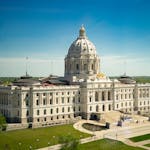Time has not deflated Edward Snowden's messianic sense of self-importance. Nor has living in an actual police state given the National Security Agency whistleblower any greater appreciation of the actual freedoms that Americans enjoy.
Insufferable is the first adjective evoked by Snowden's recent interview with Barton Gellman in The Washington Post, but it has numerous cousins: smug, self-righteous, egotistical, disingenuous, megalomaniacal, overwrought.
The Snowden of Gellman's interview is seized with infuriating certitude about the righteousness of his cause. Not for Snowden any anxiety about the implications for national security of his theft of government secrets, any regrets about his violations of a duty of secrecy.
"For me, in terms of personal satisfaction, the mission's already accomplished. I already won," Snowden proclaimed. "Because, remember, I didn't want to change society. I wanted to give society a chance to determine if it should change itself."
And what gave Snowden the right to assume that responsibility? "That whole question — who elected you? — inverts the model. They elected me. The overseers," he said. "The system failed comprehensively, and each level of oversight, each level of responsibility that should have addressed this, abdicated their responsibility."
Thankfully, at least as Snowden sees it, he was there to pick up the slack. "The oath of allegiance is not an oath of secrecy," he said. "That is an oath to the Constitution. That is the oath that I kept that [National Security Agency Director] Keith Alexander and [Director of National Intelligence] James Clapper did not."
Snowden followed his Post interview with an overheated Christmas message that was broadcast on British television. A child born today, he warned, will "never know what it means to have a private moment to themselves, an unrecorded, unanalyzed thought."
Oh, come on. George Orwell himself would have told Snowden to chill — and the author of "Animal Farm" surely would have shown more recognition of the irony of Snowden's sojourn in Vladimir Putin's Russia. Does a man whose life is conducted so much online really believe that Putin's spies are not cyber-peering over his shoulder?
The whistleblower personality is rarely an attractive one. Whistleblowers tend to be the difficult ones, the sort who tend to feel freer to speak out precisely because they don't fit in. So perhaps it is not a surprise that the biggest whistleblower of all time has an unpleasant personality to match. And personality would not matter — at least it would not be so grating — if Snowden's behavior were more upstanding and his actions more justified.
On behavior, if Snowden is such a believer in the Constitution, why not stick around to test the system that the Constitution created and deal with the consequences of his actions?
The harder question, because the cost-benefit analysis is inherently both opaque and subjective, concerns the actions themselves. Is Snowden's massive theft justified by the degree of governmental intrusion he unveiled; the importance of the public discussion he provoked; the systemic shortcomings, if not outright failures, that both eroded adequate oversight and short-circuited the possibility of public debate absent his intervention? On the other, even more unknowable side of the ledger, is the lasting damage to U.S. security from having its capabilities exposed for America's enemies to see.
Your assessment might be different. My scale weighs against Snowden. He launched an important, overdue debate, and reassessment of collection practices. Perhaps that would not have happened otherwise. The intelligence community is now reaping the bitter rewards of its combined aversion to transparency and addiction to employing available technology to maximum potential.
Yet the existing oversight, while flawed, is not as feckless as Snowden portrays it, and the degree of intrusion on Americans' privacy, while troubling, is not nearly as menacing as he sees it. In the government's massive database is information about who I called, and who they called in turn. Perhaps the government shouldn't have it; surely, there should be more controls over when they can search it. But my metadata almost certainly hasn't been scrutinized; even if it has, the content of the calls remains off-limits.
If the scope of Snowden's theft and subsequent disclosures had been so limited, my scale might balance in the opposite direction. But the theft was massive. The injury to intelligence gathering is of equal magnitude. "I am still working for the NSA right now," Snowden announced. "They are the only ones who don't realize it."
Orwell might have called that double-think.





